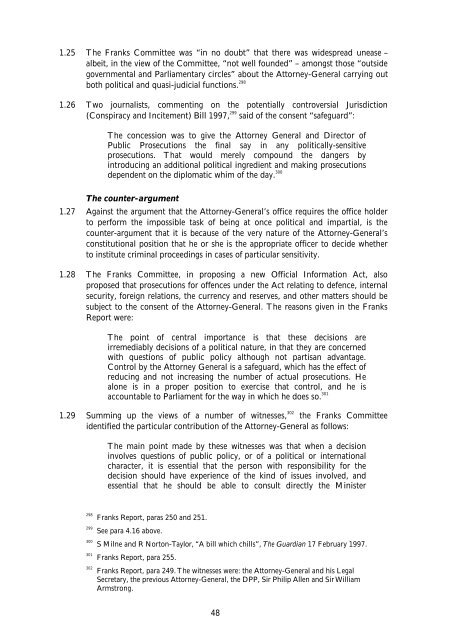cp149 Consents to Prosecution consultation - Law Commission
cp149 Consents to Prosecution consultation - Law Commission
cp149 Consents to Prosecution consultation - Law Commission
Create successful ePaper yourself
Turn your PDF publications into a flip-book with our unique Google optimized e-Paper software.
1.25 The Franks Committee was “in no doubt” that there was widespread unease –<br />
albeit, in the view of the Committee, “not well founded” – amongst those “outside<br />
governmental and Parliamentary circles” about the At<strong>to</strong>rney-General carrying out<br />
both political and quasi-judicial functions. 298<br />
1.26 Two journalists, commenting on the potentially controversial Jurisdiction<br />
(Conspiracy and Incitement) Bill 1997, 299<br />
said of the consent “safeguard”:<br />
The concession was <strong>to</strong> give the At<strong>to</strong>rney General and Direc<strong>to</strong>r of<br />
Public <strong>Prosecution</strong>s the final say in any politically-sensitive<br />
prosecutions. That would merely compound the dangers by<br />
introducing an additional political ingredient and making prosecutions<br />
dependent on the diplomatic whim of the day. 300<br />
The counter-argument<br />
1.27 Against the argument that the At<strong>to</strong>rney-General’s office requires the office holder<br />
<strong>to</strong> perform the impossible task of being at once political and impartial, is the<br />
counter-argument that it is because of the very nature of the At<strong>to</strong>rney-General’s<br />
constitutional position that he or she is the appropriate officer <strong>to</strong> decide whether<br />
<strong>to</strong> institute criminal proceedings in cases of particular sensitivity.<br />
1.28 The Franks Committee, in proposing a new Official Information Act, also<br />
proposed that prosecutions for offences under the Act relating <strong>to</strong> defence, internal<br />
security, foreign relations, the currency and reserves, and other matters should be<br />
subject <strong>to</strong> the consent of the At<strong>to</strong>rney-General. The reasons given in the Franks<br />
Report were:<br />
The point of central importance is that these decisions are<br />
irremediably decisions of a political nature, in that they are concerned<br />
with questions of public policy although not partisan advantage.<br />
Control by the At<strong>to</strong>rney General is a safeguard, which has the effect of<br />
reducing and not increasing the number of actual prosecutions. He<br />
alone is in a proper position <strong>to</strong> exercise that control, and he is<br />
accountable <strong>to</strong> Parliament for the way in which he does so. 301<br />
1.29 Summing up the views of a number of witnesses, 302<br />
the Franks Committee<br />
identified the particular contribution of the At<strong>to</strong>rney-General as follows:<br />
The main point made by these witnesses was that when a decision<br />
involves questions of public policy, or of a political or international<br />
character, it is essential that the person with responsibility for the<br />
decision should have experience of the kind of issues involved, and<br />
essential that he should be able <strong>to</strong> consult directly the Minister<br />
298 Franks Report, paras 250 and 251.<br />
299 See para 4.16 above.<br />
300 S Milne and R Nor<strong>to</strong>n-Taylor, “A bill which chills”, The Guardian 17 February 1997.<br />
301 Franks Report, para 255.<br />
302 Franks Report, para 249. The witnesses were: the At<strong>to</strong>rney-General and his Legal<br />
Secretary, the previous At<strong>to</strong>rney-General, the DPP, Sir Philip Allen and Sir William<br />
Armstrong.<br />
48
















